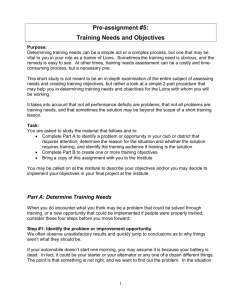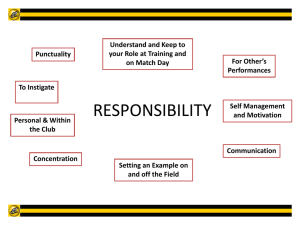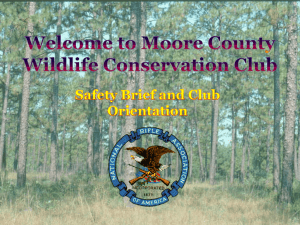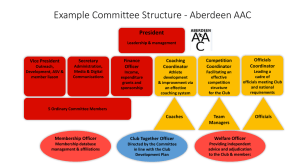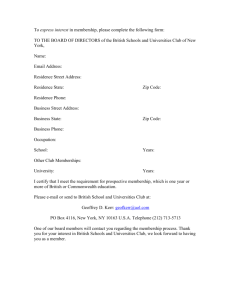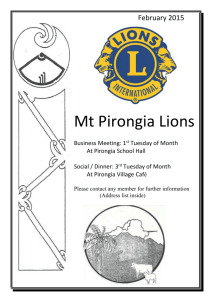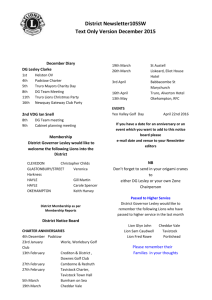Member Motivation Pre-Assignment 1
advertisement
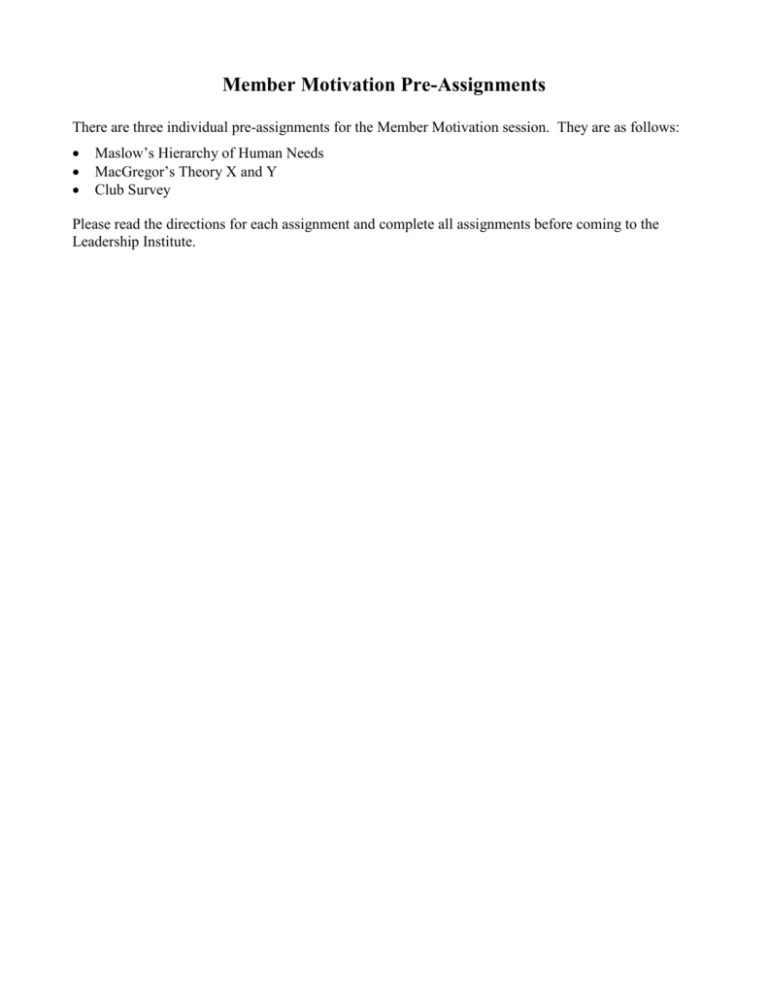
Member Motivation Pre-Assignments There are three individual pre-assignments for the Member Motivation session. They are as follows: Maslow’s Hierarchy of Human Needs MacGregor’s Theory X and Y Club Survey Please read the directions for each assignment and complete all assignments before coming to the Leadership Institute. Member Motivation Pre-Assignment 1 Maslow’s Hierarchy of Human Needs Abraham Maslow developed an interesting and useable framework to explain the strength of certain needs. Please review the five levels of human needs below before arriving at the Lions Leadership Institute. This material will be used in class discussion at the institute. Level 5: Self-Actualization Needs (optimizing personal potential) Maslow felt few people ever achieved this level. At this level, we are motivated to become what we are capable of becoming; to reach full potential, and in so doing, to fulfill one’s self. Level 4: Ego-Enhancement Needs (recognition, accomplishment) Most people have a need for high evaluation of themselves that is based on recognition and respect from others. Satisfaction of these needs produces feelings of self-confidence, prestige, power, and control. People begin to feel that they are useful and have some effect on their environment. Level 3: Social Needs (belonging to a group, having meaningful relationships) We feel a need to join with other people, to feel part of a group. Maslow talked about having “meaningful relationships” with others, relationships that transcend our everyday encounters. Level 2: Security Needs (shelter, protection, safety from harm) We are motivated to find shelter, protection and safety from attack. If an individual’s safety or security is in danger, other things seem unimportant. Level 1: Physiological Needs (food, water, items necessary for physical survival) At the most basic level, we are motivated to find food, water, and other basic physiological needs. Until these basic needs are satisfied, the majority of a person’s activity will probably be at this level. Member Motivation Pre-Assignment 2 MacGregor’s Theory X and Theory Y Douglas MacGregor in his book, “The Human Side of Enterprise” published in 1960 examined theories on behavior of individuals at work, and he formulated a model which he calls Theory X and Theory Y. Please review the two theories below before arriving at the Lions Leadership Institute. This material will be used in class discussion at the institute. Theory X Theory Y People must be supervised closely, either through direct oversight or by tight reward-and-punishment systems. People will usually, if given a chance, find ways to be active, productive, and satisfied in their work. Work is something most people find objectionable. Work is natural and enjoyable unless it is made offensive by the actions of organizations. Most people have little initiative, creativity, or problem solving skills. They prefer to have others make decisions and take responsibility for those decisions. Most people are ambitious, desire autonomy and self-control, and do effective problem solving. Creativity is distributed equally across the population. Economic rewards and security are the primary motivators for most people. Many different things motivate people, only some involve economic rewards or security. Member Motivation Pre-Assignment 3 Club Survey Instructions The survey that follows addresses some of the characteristics of Lions clubs that can either positively or negatively affect member motivation. Before you come to the Lions Leadership Institute: Make several copies of the survey Complete the survey yourself and ask one or two other club members to do the same Total the responses for each question and divide by the number of people who responded to get an average score for each question Enter the average scores on another survey form Bring the completed form indicating the average scores with you to the Leadership Institute. Be prepared to discuss the responses with a partner during the session on Member Motivation. In sharing your ideas with other Lions, you will have the opportunity to work together to highlight those practices that enhance motivation and correct those that inhibit motivation. Member Motivation Pre-Assignment 3 Club Survey This short questionnaire addresses some of the areas in which a club environment can stimulate or dampen the motivation of its members. Please rank your own perception of your club’s performance for each question using this scale: 5 = Always 4 = Often 3 = Sometimes 2 = Seldom 1 = Never ____ 1. Do you enjoy being a Lion? ____ 2. As a Lion, are you challenged to try new things? ____ 3. As a Lion, are you given the opportunity to gain leadership skills? ____ 4. Do you enjoy club meetings? ____ 5. Are new club members properly oriented to the club and to Lionism? ____ 6. Are awards and recognition presented to acknowledge the efforts of club members? ____ 7. Do you enjoy your club’s fundraising activities? ____ 8. Do you enjoy your club’s community service projects? ____ 9. Are your community service projects still relevant and successful? ____ 10. Does your club publish and distribute a newsletter to all members? ____ 11. Have you been given responsibility for activities and committees? ____ 12. Are your skills and enthusiasm being used effectively? ____ 13. Do you feel like an important part of your club? ____ 14. Are you encouraged to participate in international, district, and zone functions? ____ 15. Are you given the opportunity to socialize and network with other Lions?
